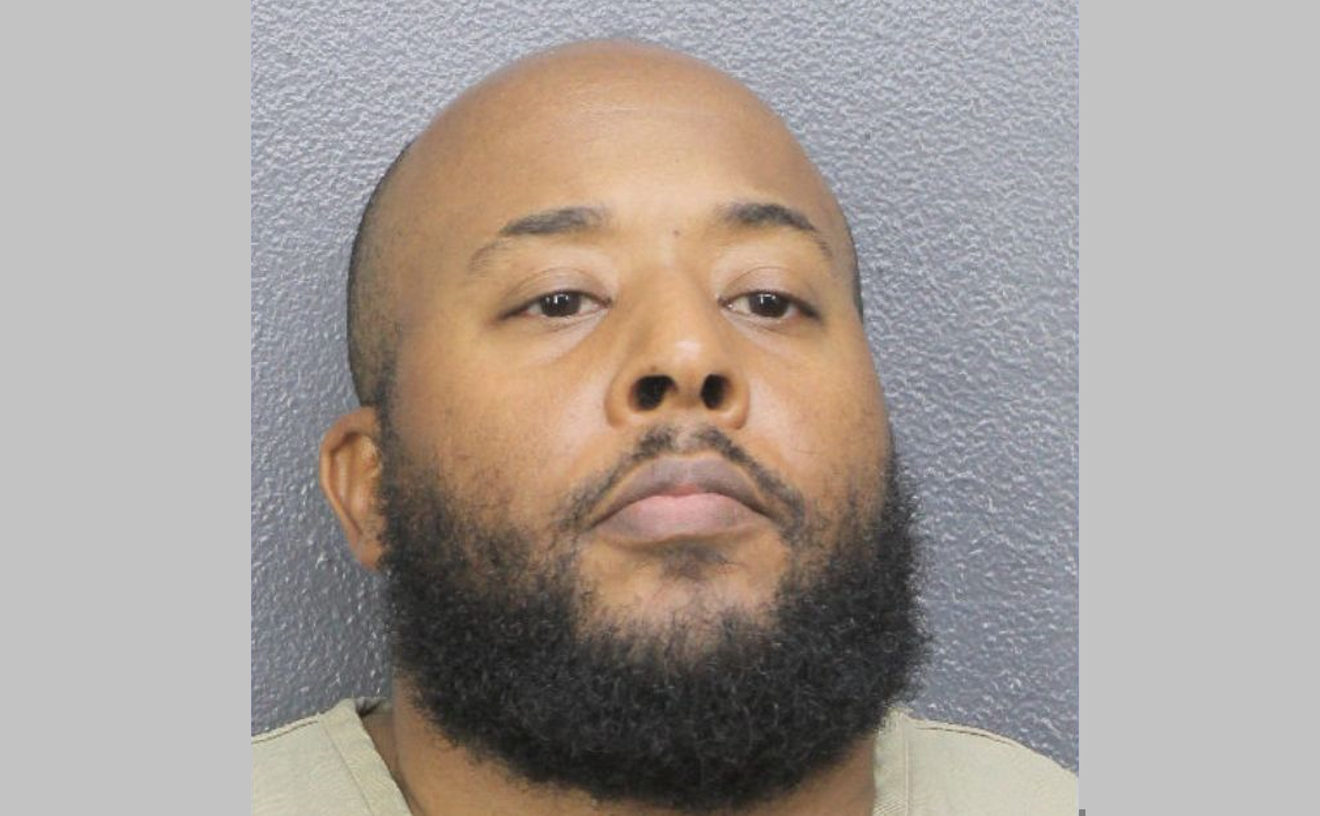Two more blocks and Polini Sanon would have made it home. The 31-year-old father of five had just left his job as a Wells Fargo banker on a Friday night in 2017 when his life took an unexpected turn.
It was just a few minutes past 6 p.m. but already dark in Overtown, with ten days to go before Christmas. Sanon, who is black, was driving his gray Chevy. His wife
But Miami Police had other plans.
Stuck behind a slow-moving car while driving down NW First Court between 18th and 19th Streets, Sanon moved left to pass. Police lights flashed on. A siren blared. Sanon pulled over, and Miami Police Officer Alain Torres informed him he had been driving on the wrong side of the road — even though there were no lines, double yellow or otherwise, on the stretch where Sanon had passed. Sanon handed over his license and registration.
Then, as Sanon waited, an unmarked SUV pulled up. Out came Capt. Javier Ortiz in his black City of Miami uniform
Ortiz ordered him to unlock the door. Sanon was concerned — he had no idea who this new officer was.
"Why do you want me to unlock the door?" Sanon asked.
"Step out of the car," Ortiz answered.
"It's recording, sir," Sanon said, pointing to his phone, which was perched in a cupholder.
"I don't really care if it's recording."
Sanon exited the Chevy, and Ortiz grabbed him by the shoulders. "Hey!" Sanon shouted.
"Hands on the car!" Ortiz snapped. There was a thud as Sanon was shoved forcefully against his car.
"Thank you so much," Ortiz said sarcastically, pulling Sanon's arms behind him and snapping handcuffs onto his wrists.
"What am I being arrested for?" Sanon asked.
"For disobeying a direct order," the cop responded, pushing Sanon toward the police cruiser.
As Sanon sat handcuffed in the back of the cop car, Ortiz returned to ask
"
"I don't care if you're recording, 'cause I can smell something in the car," Ortiz said.
Seconds later, Ortiz radioed for a K-9 unit. Before long, a drug-sniffing dog arrived and located exactly what the cop was looking for: a couple of old roaches from joints smoked long ago in the pocket of the driver-side door.
Miami cops drove Sanon to the fortress-like Turner Guilford Knight jail west of the Palmetto Expressway. He was panicking. How much of the encounter did I record? he wondered. How much will I have to pay to get out? He'd spent the last of his money on Christmas presents for his kids.
When they pulled into TGK, he was marched into a cell and told he was being charged with possession of
What happened to Sanon isn't unusual.
In the past three years, Miami-area police have sent 5,255 people to jail for possession of
“What if you took those hours and you put those into opioid arrests, which are killing people!”
tweet this
Pot arrests have been rising steadily since June 2015, when Miami-Dade County commissioners agreed to allow tickets rather than jail time for possession of
Like Sanon, many of those taken into custody had no prior convictions. Also, like the banker, they will be stuck with pot arrests listed under their names in the public record even though charges were dropped.
"They will have to live for the rest of their lives with the collateral consequences of a drug offense, even when they're doing something that is legal in nine states," says Raymer Maguire IV, manager of the ACLU of Florida's Campaign for Criminal Justice Reform. "Even years later, when they are trying to move in and rent a new house or apartment, to apply for college or even scholarships, they'll have to say they've been arrested for drugs."
New Times' review suggests at least 15,000 hours of police time — and probably double that number if court time is included — have been wasted on those collars in the past three years.
"What if you took those hours and you put those into opioid arrests — which are killing people!" says retired Flagler County Sheriff Jim Manfre, who five years ago championed an innovative program that allowed teens busted with small amounts of pot to receive tickets and community service instead of criminal records. "Nobody has died from an overdose of marijuana, but people are dying every day from opioids. Wouldn't it make more sense to put that kind of time into going after the stuff that's really affecting our community?"
Marijuana wasn't always illegal in the United States. Though some states began to regulate it in the early 1900s, it wasn't until the 1930s that the crackdown on pot began in earnest with Harry Anslinger. He had risen to prominence in the Bureau of Prohibition when alcohol was still banned and then switched to demonizing pot when it became clear his position would soon be obsolete. Later, as commissioner of the Federal Bureau of Narcotics, Anslinger used fear to turn public opinion against weed.
"How many murders, suicides, robberies, criminal assaults, holdups, burglaries, and deeds of maniacal insanity marijuana causes each year, especially among the young, can only be conjectured," Anslinger wrote in 1937.
When testifying before Congress regarding a bill to regulate pot that same year, Anslinger described crimes that had nothing to do with marijuana and events that stoked racial fears: "Colored students at
The result was the Marihuana Tax Act, which effectively made possession and sale of weed illegal. The Supreme Court found the stricture unconstitutional in 1969, but lawmakers swiftly replaced it with the Controlled Substances Act, which carried steeper penalties and classified pot, along with heroin and peyote, as Schedule 1 narcotic.
Times are changing, but maybe not fast enough for the tens of thousands of Floridians arrested each year for possessing something most Americans view as less harmful than alcohol. And even when counties adopt alternatives to arrest, such as citations or diversion programs for those caught with small amounts of pot, cops ignore their elected leaders and send people to jail rather than give them tickets.
A DEA drug fact sheet notes no deaths from marijuana overdoses have ever been reported. Since 2012, nine states have legalized pot for recreational use. Thirty states, including Florida, have legalized medical marijuana.
A University of North Florida poll administered earlier this year found 62 percent of Sunshine State voters favor legalizing recreational weed. In the past five years, 60 counties — including Miami-Dade and Broward — have started programs allowing police to dole out citations for possession of small amounts of pot (and other minor crimes, such as loitering and trespassing), though many of those programs apply to juveniles only. This past March, the state Legislature passed a bill encouraging adult ticketing programs.
Yet in 2017, 42,153 people were arrested in Florida on misdemeanor pot charges, about 6 percent more than the previous year. Almost half of those charged were black, even though black people account for only about 17 percent of Florida's population, according to state data shared by the American Civil Liberties Union. That means black people are almost four times likelier to get arrested for pot than white people.
This pattern is on full display during Urban Beach Week. This past May, Miami Beach Police arrested 40 people, many of whom were black, on misdemeanor drug charges — mostly for small amounts of pot. That contrasted with Ultra Music Festival in Bayfront Park, where the City of Miami took a very different approach by allowing mostly white attendees to leave drugs in "amnesty boxes."
In fact, Miami Beach cops barely hand out citations even though the city commission unanimously approved ticketing in 2015. Beach cops claimed the program would save taxpayers $40,000 per year.
In the 18 months between January 2017 and the end of July 2018, MBPD issued a scant 33 tickets for pot. This year's total: three.
Miami-Dade County adopted $100 fines for pot around the same time as the Beach. The idea behind the bill, sponsored by Commissioner Sally Heyman, was to free up police resources and taxpayer dollars while also preventing more people, particularly youth, from racking up arrest records.
"We have better things to do with our police resources," Heyman said. "For goodness' sake, we don't have to destroy the lives of so many."
The move passed 10-3, but in the years after the vote, police actually ramped up pot arrests. The countywide ordinance simply gave municipalities the option to create ticketing programs — it didn't require it. So not all Miami-area police departments issue citations in lieu of arrest. Some, like Miami Beach, tack on extra requirements, such as one that renders people caught with pot ineligible for a ticket if they are driving when stopped.
Arresting scores of people for joints is "a strain on criminal justice resources; it takes away hundreds of thousands of dollars from what we need in the budgets," Heyman says today. "We need our officers to reassert the priority of public safety and address gun violence, opioid problems, and human trafficking, not cases that are dismissed. It's a huge waste."
Heyman's office shared a list of the 23 Miami-Dade police departments that have signed onto the citation program. It includes the City of Miami.
At a February 2017 commission meeting, then-Miami Police Chief Rudy Llanes expressed support for the move toward tickets and fines rather than arrests. "[Citations for] possession of the cannabis," he said, "I have no problem with."
But 18 months later, nothing has changed. Although the Miami City Commission agreed to allow officers to issue citations for misdemeanor pot possession in February 2017, MPD still only arrests pot smokers and takes them to jail. There is no ticket program. "The department is in the process of getting this program up and running," says Orlando Rodriguez, a public information officer.
It's all smoke and mirrors when it comes to pot policy. It always has been.

Luca
One thing is clear, though: Police have already limited his options.
On a warm winter night in Kendall this past February, Luca, who earned his GED last year, was driving with a friend on SW 147th Avenue near SW 104th Street when a cop pulled them over. His friend had attached a license plate that hadn't been assigned to the 2007 black Chrysler. Cops thought they smelled pot, so they told the teenagers to step out while the officers conducted a search. Soon they found a plastic baggie with less than five grams of marijuana. Then they discovered a pipe stashed in the center console.
The cops arrested Luca, who is black, for misdemeanor possession of pot and drug paraphernalia. Both qualify for civil citations under the ordinance passed by Miami-Dade County commissioners in 2015.
The teenager had never been convicted of a crime. He grew up playing soccer with his friends and family around Kendall.
Luca spent the night in jail. He called his mom for help, but by the time he had been arrested, booked, processed, and offered a phone call, she was already asleep. So he found a bail bondsman and got out the next day. When he went to court this past March, the judge gave him a 60-day reset, meaning the charges would be dropped if he avoided trouble for two months. He did.
The criminal case went away, but the arrest record and criminal history are here to stay.
"It will have far-reaching consequences," says Luca's mom, a teacher and mental health professional who asked that her name not
And so it goes. A New Times review of 50 random pot-possession cases found most follow the same pattern: A person of color is pulled over for a broken tail light, an expired temporary tag, or not wearing a seat belt. When the window is opened, there's a "strong odor of marijuana emanating from the vehicle," even when it ends up being in a sealed bag and tucked away somewhere. The defendant "spontaneously says" the pot is his (the overwhelming majority are men) and then "consents to a search." He's arrested. If police are lucky enough to find a grinder or a pipe along with the bag of weed, two charges are filed.
“The trauma, the waste of time, the record, for what? A f—-ing herb that makes you happy, hungry, and sleepy?”
tweet this
Handcuffs, a drive to jail, paperwork, and storing evidence follow. The arrestee's car is towed; hundreds or thousands of dollars in bond and court fees are paid while at least a day of work is lost. And then there's that pesky criminal record. Of the 50 cases reviewed by New Times, only one resulted in a conviction. In 41 cases, charges were dropped by the prosecution. In eight, adjudication was withheld. Forty people of color were arrested. Just ten were white.
Virtually all of the cases highlight problems with the way the civil citation law is being applied. Some examples:
• Nineteen-year-old Mara Bowden was wandering around downtown Miami one night this past March when someone called the cops to say she was crying hysterically, requesting help, and saying she had no idea where she was. Cops hurried over, but rather that offer aid, they searched her bag. When they found a small amount of weed, they sent her to jail, where she spent the night before her mom bonded her out. Charges were dismissed.
• Pedro Saria was pedaling a bicycle a few blocks from his home in Allapattah on June 19 when Miami Police Officer Joshua Perez stopped the 18-year-old for allegedly running a stop sign. Perez claimed he smelled weed, so he searched the teen and found a baggie in his pocket. Perez took him to TGK. He received a 60-day reset on July 13, meaning the charges will be dropped if he stays out of trouble until September 13.
• Quandria Lashon, age 31, was driving near her home in Brownsville with a friend on January 5, 2016, when Miami-Dade Police Officer George Eugene pulled her over and said he smelled pot. He found a folded dollar bill with some loose buds weighing less than a gram in her back pocket and a grinder with less than two grams in her purse. "That's mine. It's just weed," Lashon said to the officer before being carted off to TGK. The charges were dropped.
None of those taken into custody had any prior convictions. All were eligible for citations because they fell within the parameters of the 2015 countywide ordinance.

Sitting in a coffee shop a few blocks from his house in Overtown on a mid-July afternoon, Polini Sanon shakes his head as he replays the night he was arrested for less than a gram of pot. Overall, he estimates the case cost him close to $1,000 between the bond, court fees, and missed work. On March 12, after three trips to court, the charges were dropped.
"I felt helpless," he says. "It's been very stressful the past six months... It's not just the arrest — it keeps coming back, the arraignment hearing, the trial, and I had to take off work for all of that."
Sanon grew up in Overtown, where he still lives with his family. After graduating from Booker T. Washington High School in 2004, he headed north to Edward Waters College in Jacksonville, where he studied business administration. He graduated in 2008 and began studying for a master's of business administration before leaving to provide for his children. Since 2011, he has worked at Wells Fargo, where he handles customer concerns and opens accounts and credit cards.
Sanon is wiry and handsome, with expressive brown eyes and a big smile. He's prone to gesticulating when explaining things and often looks off to the side, smiles, and shakes his head when he broaches more distressing subjects. He's extremely polite — "Yes, ma'am," "No, sir" — and though he spent hours in a coffee shop with a reporter on his day off, he didn't touch any coffee. He's having enough trouble sleeping as it is, he says.
The arrest was particularly traumatizing for Sanon because of a past experience with a police officer sworn to protect the public.
In 2011, a Miami cop named Adrian Rodriguez punched Sanon in the face when he arrested the then-25-year-old outside his home on NW First Court in Overtown during a going-away party for a lifelong friend. The officer cuffed Sanon's hands behind his back, and when he shoved him into the rear of the cruiser, a ligament in Sanon's wrist was torn.
After prosecutors dismissed the charges, Sanon filed an internal affairs complaint. In 2014, he sued the city for wrongful arrest and excessive use of force. The case was later settled. The parties paid their own court fees, but Sanon declines to say how much he received. (Rodriguez was later fired, reinstated, and recently suspended for unrelated matters.)
So that night in December when Capt. Javier Ortiz found roaches in his car, Sanon started to have a panic attack in the back of the police cruiser. His chest began pounding. He was sweating. He could barely breathe. I have a job; I have kids to take care of, Sanon thought. I can't afford this. The cops, noticing his state, pulled the cruiser over and took him out for some air, Sanon says.
"This would have all gone smoothly if you hadn't started recording, Mr. ACLU," Sanon recalls Captain Ortiz telling him, referring to the banker's use of a cell-phone camera to film the arrest.
That night at the county jail, guards took Sanon's dress shirt and tie and gave him an orange jumpsuit. He was sent to a cold cell where he spent the night lying awake, wondering what would happen next.
When Sanon finally left jail that Saturday afternoon, he rushed home, where he and his wife
"When I got back to work [at the bank] that Monday, I was distracted," he recalls. "I couldn't stop thinking about what happened that night." He's in therapy now so he can receive medication for insomnia. "I began to feel really paranoid. I kept reliving that moment."
He's looking for new employment, but the arrests have made it difficult for him to find a job.
“This would have all gone smoothly if you hadn’t started recording, Mr. ACLU.”
tweet this
One day, while Sanon was working at Wells Fargo, two young women walked in. "They said, 'Oh, I seen you on Mugshots.com' or something like that," he recalls. "It was heartbreaking. I felt so embarrassed."
He filed an internal affairs complaint against Ortiz three months ago, but as of August 13, no one had been assigned to review it.
As for the presents, the ones that made money extra-tight when Sanon was arrested ten days before Christmas: "I got my oldest an iPhone; she's 12. For my girls [ages 7 and 10], I got them a tablet. And my twins," he says, a wistful smile spreading across Sanon's face — he always wanted a boy and was ecstatic when he got two — "I got them one of those little Jeeps, you know? The ones they can drive. They love it."
In the end, Sanon and more than 5,000 others have unnecessarily spent the night in a Miami-Dade jail. Police could have issued many of them but instead chose to spend taxpayers' time and money depriving people with small amounts of
Yet Miami-Dade County does have a citation program that's working — but only for children under the age of 18.
In the past three years, police here have handed out citations that require community service or counseling to 3,218 children caught committing minor misdemeanors such as loitering, vandalism, trespassing, and possession of
When this regimen is followed, kids have cleaned up their acts. In 2011, roughly 2,200 were caught committing minor misdemeanors. But six years later, significantly fewer were committing crimes: Only 953 in Dade were busted for violating the law in 2017.
In the decade that Miami-Dade has employed the juvenile civil citation program, recidivism has dropped to 3 percent — lower than the state average of 4 percent and significantly less than the 12 percent rate for juveniles who are arrested.
Diverting kids from jail has saved Florida taxpayers tens of millions of dollars since the program began. The cost to the public for an arrest is at least $1,468 more than a ticket, according to the Southern Poverty Law Center. The citation program has also reduced the number of kids with criminal records.
Jim Manfre, who retired as sheriff of Flagler County in North Florida earlier last year, is a strong advocate for ticketing those arrested with pot. His support for the program comes from personal experience. He spent decades in law enforcement — as a prosecutor, a defense attorney, and a sheriff — but he and his group of friends weren't always on the right side of the law growing up in Long Island. He and his group of friends would get into minor criminal mischief, like stealing six-packs from convenience stores. "Normal things that unruly kids do," Manfre says, "but in those days, law enforcement didn't drag you to jail; they'd admonish you and bring you home to your parents."
Cops didn't arrest the boys but instead counseled them on how to clean up their lives. "What made us successful," Manfre says, "was the recognition by law enforcement that we weren't bad kids, that we were just doing stupid things, and that understanding took us a lot further than arresting us did."
Manfre oversaw a successful civil citation program in Flagler, just south of St. Augustine, and tried to extend it to adults arrested for small amounts of weed. "I think we need to consider whether the penalty fits the crime that was committed," he says. Arresting people for marijuana is "stupid, wasteful, and ineffective. It's a waste of taxpayer money, a waste of law enforcement resources, and ultimately, it's not making the community any safer."












